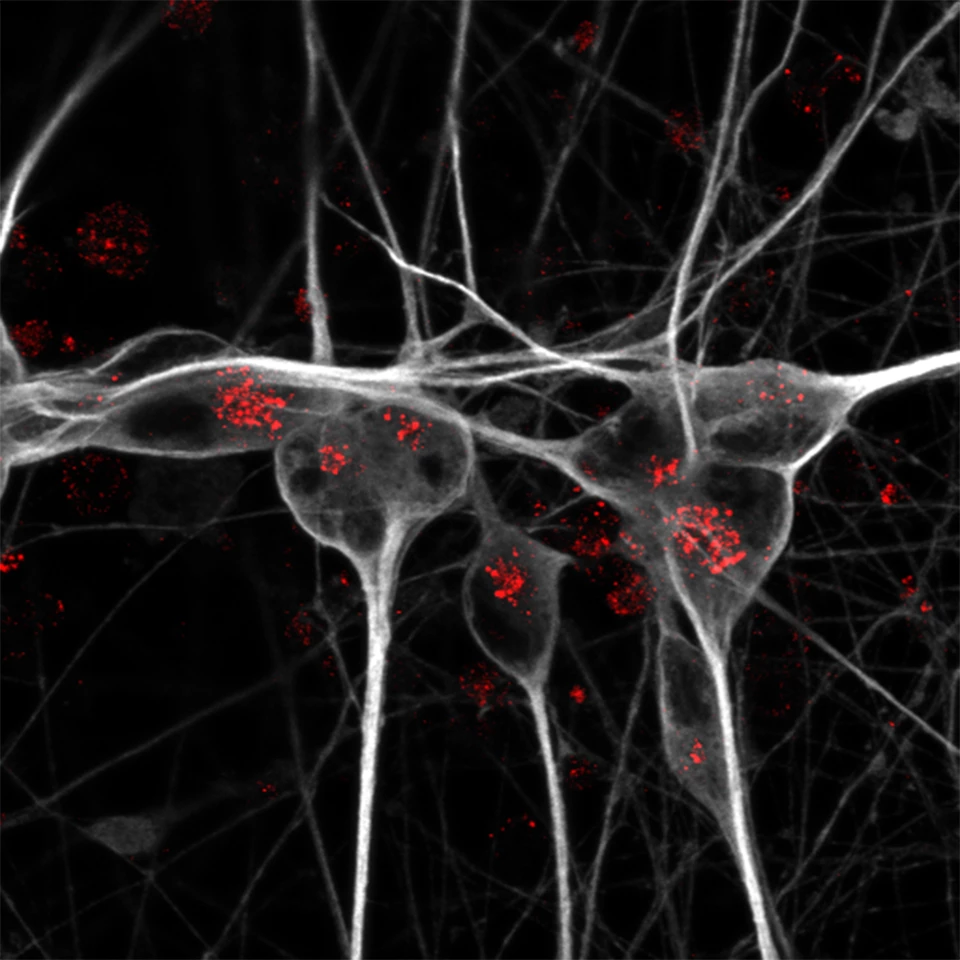A new study has pinpointed how the APOE4 gene variant sabotages the brain’s energy balance, blocking neurons from burning fat for fuel when glucose runs low, a discovery that could reveal new ways to prevent or slow Alzheimer’s disease.
Everyone inherits two copies of the APOE gene, one from each parent. The gene has several versions, or alleles: APOE2, APOE3, and APOE4. While APOE3 is the most common and relatively neutral, APOE4 dramatically raises the risk of late-onset Alzheimer’s disease.
For years, scientists have known of this link, but not the mechanism underpinning it. A new study co-led by Aarhus University, Denmark, and the Max Delbrück Center in Germany has identified the mechanism by which APOE4 causes damage in the brain.
“The ability to use glucose diminishes in the aging brain, forcing nerve cells to use alternative sources for energy production,” said corresponding author Thomas Willnow, a professor in the University’s Department of Biomedicine. “APOE4 appears to block nerve cells from utilizing lipids as an alternative energy source when their supply of glucose decreases.”
Glucose is the brain’s primary fuel source, supplying the energy needed for neurons to communicate, repair, and maintain healthy function. Unlike other organs, the brain can’t store much glucose, so it relies on a constant supply from the bloodstream and a finely tuned system that converts it into usable energy within cells. As we age, this system becomes less efficient. Glucose uptake and metabolism gradually decline, leading to subtle energy shortages that can impair memory and cognition.
In Alzheimer’s disease, this energy crisis becomes more severe: neurons lose their ability to use glucose effectively, even in the presence of normal blood sugar levels. Brain imaging studies consistently show reduced glucose metabolism in areas responsible for learning and memory, suggesting that this “fuel failure” may be one of the earliest and most damaging events in the disease process.
To get to the bottom of this failure, the researchers used a mix of human brain tissue, lab-grown brain organoids (miniature brain models), and genetically modified mice. They compared cells carrying APOE3 (the “normal” version) and cells carrying APOE4 (the high-risk version). They examined how these versions affected how fats are processed in the brain cells (lipid metabolism); neuron and glial cell function, especially astrocytes and microglia; and the accumulation of tau and amyloid-beta proteins, two hallmark proteins that clump in Alzheimer’s brains.

Aarhus University/Anna Greda
APOE4 was found to cause toxic lipid buildup. APOE normally helps shuttle cholesterol and other fats around the brain. APOE4, however, mismanages lipid transport, leading to fat accumulation inside neurons. This buildup stresses the neurons, making them more vulnerable to damage. The fat overload in astrocytes and microglia activates inflammatory pathways. Chronic brain inflammation contributes to neuronal death and worsens amyloid and tau pathology.
APOE4 also interfered with lysosomal function, the brain’s waste disposal mechanism. As a result, toxic proteins and damaged fats aren’t cleared effectively, which accelerates degeneration. Structural analysis showed that APOE4’s altered shape made it prone to sticking to cell membranes and lipids abnormally. This structural instability is the root of its malfunction.
“By using transgenic mouse models and stem-cell-derived human brain cell models, we discovered that the pathway enabling nerve cells to burn lipids for energy production doesn’t work with APOE4, because this APOE variant blocks the receptor on nerve cells required for lipid uptake,” said Anna Greda, assistant professor at the Willnow lab at Aarhus University and the study’s co-lead author.
The researchers acknowledge the study’s limitations. The principal one is that most models were lab-based, so results might not capture the full complexity of the human brain. And, while animal models approximate human disease progression, they don’t replicate it perfectly. Additionally, APOE4 effects may differ by sex and ethnicity, which this study didn’t deeply explore.
Nonetheless, the study’s findings have therapeutic potential. Understanding that APOE4’s toxicity comes from mismanaged lipids and inflammation opens new drug targets, particularly in lipid metabolism and lysosomal repair.
“Our research suggests that the brain is highly dependent on being able to switch from glucose to lipid as we age,” said the study’s other lead author, Jemila Gomes, PhD, a postdoctoral researcher in the Willnow lab. “It seems that individuals who are carriers of the APOE4 gene may be compromised to do so, increasing their risk of nerve cell starvation and death during aging.”
Some labs are already testing “APOE4 stabilizers” that could make it behave more like APOE3. Since lipid metabolism is involved, diet and cholesterol control might partly influence disease progression in APOE4 carriers, though this remains under investigation.
The study was published in the journal Nature Metabolism.
Source: Max Delbrück Center








